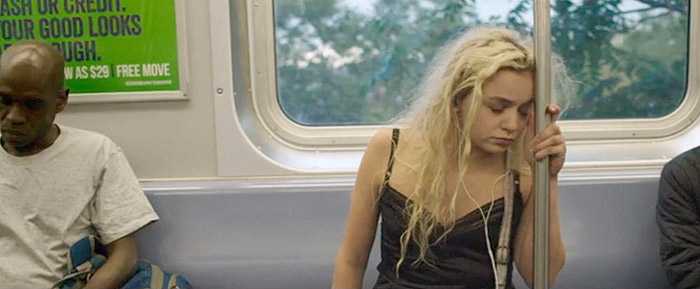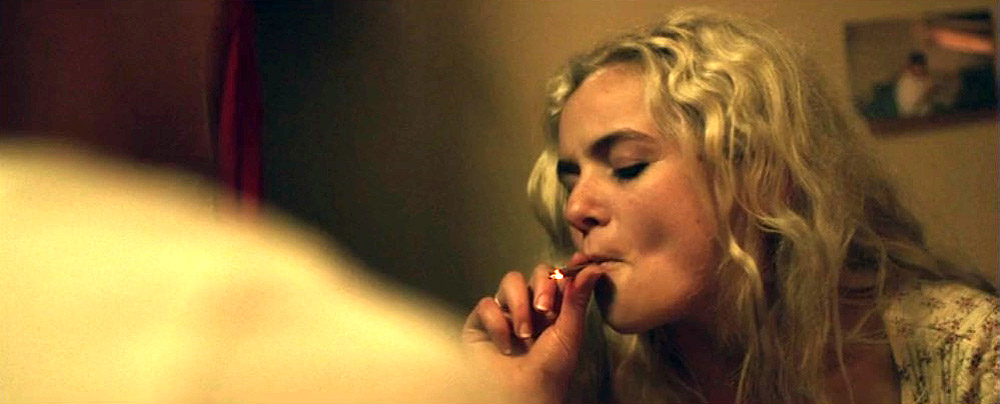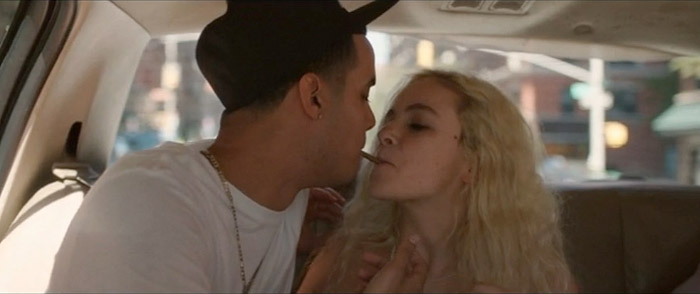What Quentin Tarantino did for the aestheticization of mind f*cking cinematic violence, Director-Writer Elizabeth Wood’s ravishing work of soft porn may do for filmmakers daring to feature libidinous white females who gorge on sex and drugs yet barely suffer the dire consequences and debasement that happen to real life profligates.
But, and this is a big but, the lead temptress has to be as sensually and erotically desirable as Wood’s lead protagonist and the filmmaker better have the cinematic panache and daring of Wood to avoid being labelled pornographic trailer trash.
WHITE GIRL is so visually well made that some early reviews seemed as if the reviewers had been under the influence of a Rorschach experiment and that they wrote about their visceral responses to a compelling piece of erotica, while ignoring or being temporarily blinded to an unconvincing and tepid script a few rewrites away from real significance.
Millennials Leah (Morgan Saylor) and Katie (India Salvor Menuez) move into a Bushwick, Brooklyn, walk-up and Leah spots drug dealers – millenials like themselves (but of a different socioeconomic pedigree, obviously) – across the street from her building, and she seeks them out to score. She almost seems attracted to them but it’s unclear why. Is she merely slumming?
This reviewer isn’t sure about the ethnicity of the light brown skin, millennial drug dealers who could be Latin or Black or Latin/Black or even Italians posing as ethnic drug dealers. That’s been known to happen – New York City, if you believe in a higher power, is a divinity’s cross-cultural, biracial Garden of Eden – but was that what the director-writer intended? Or did this reviewer miss the point?
Leah locks on to their light brown skin leader, Blue, (Brian Marc), whose constant “my n*ggers” – not “my n*ggas” – in several scenes caused this reviewer to be willing to believe Blue was Black. A Times reviewer said Blue was Puerto Rican. So it goes. This writer has mistaken Dominican born and raise folks as African American more than once.
At their first encounter, Blue tells Leah something like, quotation marks for effect, “Hey, white girls like you don’t come to score on this block, so you best be careful.” Me Tarzan, You Jane, immediately popped into this reviewer’s mind, the repartee of the two soon-to-be lovers at the level of Johnny Weissmuller-Maureen O’Sullivan repartee. Leah, in an unrealistic rapprochement and to the chagrin of her roommate (who later changes her mind about mixing it up with the Bushwick homies) eventually invites Blue and his crew up to their apartment.
We know little about the background of the fetchin’ and smokin’ hot Leah but I believe she and her roommate are suppose to be transplants from Small Town USA, not metro New York City suburbs. Eventually, let’s say in a New York Minute, she and Blue get it on.
And Leah eventually helps him and his crew of “n*ggers,” “n*ggas”, whatever, score big bucks with affluent contacts, white of course, whom Leah has met at her gig in what looks like some kind of SoHo startup. Some of the Bushwick drug-selling homies start making big bucks from the extravagant fees for the drugs they had been peddling on their home turf at a reduce rate.
Blue eventually gets busted, his third, by an undercover narc, setting him up as a three-strikes candidate, and Leah embarks on a mission to get him out of jail – at any cost, regardless of the perils to her sanity and, at times, her life. Often stoned out of her mind, she seems unrealistically stoic and indomitable in the face of lecherous and rapacious debauchery from dangerous predators on her mission to help Blue. It is very unclear the source of her inner strength.
Earlier in the movie, she gave head to her amoral boss (Justin Bartha) in his SoHo office (while the rest of his staff, pretty much white, is hard at work at their computer consoles). That took place on what looked like her first day on the job after he offered her two snorts of coke. Later on at a downtown club soiree, she snorts coke off his penis. She later does it in the alley with Blue. Etcetera. Etcetera. Etcetera.
Audiences won’t see genitalic acrobatics but swells of scenic orgasmic verisimilitude are evident and will not let eyes stray form the screen. The Bushwick, Brooklyn, landscape of the lead protagonists’ turfs as well as the downtown New York City party club scenes and hangouts aren’t lacking for verisimilitude either and are good for atmosphere. The Variety reviewer that wrote that Director Wood should have been considered one of 10 directors with must-see films at an earlier Sundance Film Fest was absolutely right.
But his comment that the film “offers an unflinching look at the juxtapositions and frictions of race and class that happen every day in contemporary New York” is so hokey that I snarl with contempt. A New York Times review headlined yesterday, August 2, “White Girl, a Tale of Cocaine, Sex and Privilege”: To what degree has hard partying with sex and drugs become entrenched as a hazardous rite of passage for bored millennials? Leah (Morgan Saylor), the doll-faced blond protagonist … is an ebullient New York City college student with an appetite for marijuana, cocaine and casual sex.”

After a night of hard partying, Leah nods off on a Brooklyn-bound train.
This reviewer can imagine affluent or privileged millennials being bored and engaging in lecherous debauchery. He can’t imagine that description applying to the millenials enrolled in his classes at Hunter College, City University of New York. Working more than one part-time job to pay their way through College or working full time with a part-time gig, and dealing with family responsibilities, showing up in class after a night or nights of profligate binging? No way.
According to some reviews, WHITE GIRL is autobiographical – or somewhat biographical. Hmmm? The articles by writers whom this reviewer imagines were able to interview the director, however, were very vague about the boundaries between fiction and reality – as if the reviewers weren’t as daring with their questions as Wood as she is with her movie. The performances overall with young actors and veterans – the latter being Christopher North as lawyer George Fratelli, Justin Bartha as Leah’s Soho boss and Adrian Martinez as a menacing drug thug – range from okay to very good, especially Morgan Saylor as Leah.
New York Release Date: Yesterday, September 2.
Los Angeles Release Date: September 9, 2016
Nationwide Release Date: September 16, 2016
Running Time: 88 Minutes
MPAA Rating: TBD (Ha Ha Ha)
Promo blurb: Summer, New York City. A college girl falls hard for a guy she just met. After a night of partying goes wrong, she goes to wild extremes to get him back.
Gregg Morris can be reached at gmorris@hunter.cuny.edu

